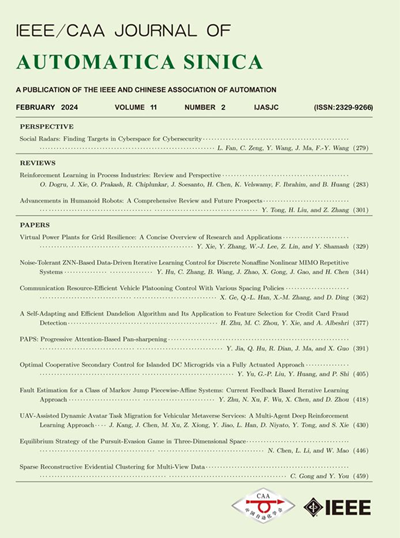Mixed Motivation Driven Social Multi-Agent Reinforcement Learning for Autonomous Driving
IF 19.2
1区 计算机科学
Q1 AUTOMATION & CONTROL SYSTEMS
引用次数: 0
Abstract
Despite great achievement has been made in autonomous driving technologies, autonomous vehicles (AVs) still exhibit limitations in intelligence and lack social coordination, which is primarily attributed to their reliance on single-agent technologies, neglecting inter-AV interactions. Current research on multi-agent autonomous driving (MAAD) predominantly focuses on either distributed individual learning or centralized cooperative learning, ignoring the mixed-motive nature of MAAD systems, where each agent is not only self-interested in reaching its own destination but also needs to coordinate with other traffic participants to enhance efficiency and safety. Inspired by the mixed motivation of human driving behavior and their learning process, we propose a novel mixed motivation driven social multi-agent reinforcement learning method for autonomous driving. In our method, a multi-agent reinforcement learning (MARL) algorithm, called Social Learning Policy Optimization (SoLPO), which takes advantage of both the individual and social learning paradigms, is proposed to empower agents to rapidly acquire self-interested policies and effectively learn socially coordinated behavior. Based on the proposed SoLPO, we further develop a mixed-motive MARL method for autonomous driving combined with a social reward integration module that can model the mixed-motive nature of MAAD systems by integrating individual and neighbor rewards into a social learning objective for improved learning speed and effectiveness. Experiments conducted on the MetaDrive simulator show that our proposed method outperforms existing state-of-the-art MARL approaches in metrics including the success rate, safety, and efficiency. More-over, the AVs trained by our method form coordinated social norms and exhibit human-like driving behavior, demonstrating a high degree of social coordination.混合动机驱动的自动驾驶社会多智能体强化学习
尽管自动驾驶技术取得了巨大的成就,但自动驾驶汽车在智能方面仍然存在局限性,缺乏社会协调能力,这主要归因于它们依赖于单智能体技术,而忽视了自动驾驶汽车之间的相互作用。当前对多智能体自动驾驶(MAAD)的研究主要集中在分布式个体学习或集中式合作学习上,忽视了MAAD系统的混合动机特性,即每个智能体不仅要达到自己的目的地,而且需要与其他交通参与者协调以提高效率和安全性。受人类驾驶行为的混合动机及其学习过程的启发,提出了一种新的混合动机驱动的自动驾驶社会多智能体强化学习方法。在我们的方法中,提出了一种多智能体强化学习(MARL)算法,称为社会学习策略优化(SoLPO),它利用了个体和社会学习范式,使智能体能够快速获取自利益策略并有效地学习社会协调行为。基于所提出的SoLPO,我们进一步开发了一种用于自动驾驶的混合动机MARL方法,该方法结合了社会奖励集成模块,可以通过将个人和邻居奖励集成到社会学习目标中来模拟MAAD系统的混合动机特性,以提高学习速度和效率。在MetaDrive模拟器上进行的实验表明,我们提出的方法在成功率、安全性和效率等指标上优于现有的最先进的MARL方法。此外,通过我们的方法训练的自动驾驶汽车形成了协调的社会规范,并表现出与人类相似的驾驶行为,显示出高度的社会协调。
本文章由计算机程序翻译,如有差异,请以英文原文为准。
求助全文
约1分钟内获得全文
求助全文
来源期刊

Ieee-Caa Journal of Automatica Sinica
Engineering-Control and Systems Engineering
CiteScore
23.50
自引率
11.00%
发文量
880
期刊介绍:
The IEEE/CAA Journal of Automatica Sinica is a reputable journal that publishes high-quality papers in English on original theoretical/experimental research and development in the field of automation. The journal covers a wide range of topics including automatic control, artificial intelligence and intelligent control, systems theory and engineering, pattern recognition and intelligent systems, automation engineering and applications, information processing and information systems, network-based automation, robotics, sensing and measurement, and navigation, guidance, and control.
Additionally, the journal is abstracted/indexed in several prominent databases including SCIE (Science Citation Index Expanded), EI (Engineering Index), Inspec, Scopus, SCImago, DBLP, CNKI (China National Knowledge Infrastructure), CSCD (Chinese Science Citation Database), and IEEE Xplore.
 求助内容:
求助内容: 应助结果提醒方式:
应助结果提醒方式:


